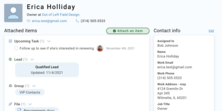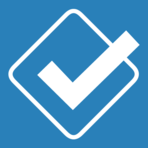Customer relationship management software for small businesses is used to manage relationships with potential customers. These solutions focus largely on improving businesses by maintaining strong connections with the existing customer pool. By doing so, small businesses can grow at a steady pace.
When businesses start growing, so does the need to have additional tools. This ensures the ability to keep up with several scaling factors such as operations, employees and most importantly, the number of customers.
In this light, small business owners often turn to customer relationship management solutions. Growth in their business means a growth in the customer pool, which is the factor most companies focus largely on. Satisfactory customer service increases the chances of those customers bringing in their friends and families to your business.
Contrary to popular belief, CRM is not just a list of customer data—it is a software solution with many capabilities related to recording, prioritizing, engaging and monitoring current statuses of your customers.
Adopting a new CRM solution can breed good results, which is why most companies and enterprises are already using one in some form. Accordingly, out of all the software solutions in the world, CRM is the biggest one in the current market. It increases sales and offers workflow enhancing functionalities to small business owners. Through the CRM capabilities this type of software offers, business processes and sales pipelines can be easily streamlined and automated.
CRM software solutions have a range of different features and price points to meet the needs of almost any type of business. Some large companies opt to use solutions like FreshSales or Zoho CRM since they have tools to match the huge demands these enterprises often face, as well as a range of advanced integrations. For smaller businesses, software solutions such as Less Annoying CRM and Hubspot CRM are the best options to have, as they are tailored towards the often more general needs of small businesses and come at a lower price.

 Less Annoying CRM provides small businesses with every capability they could need to track contacts, leads, and follow-ups without any extra hassle.
Less Annoying CRM provides small businesses with every capability they could need to track contacts, leads, and follow-ups without any extra hassle.
Small businesses use CRM to organize contacts, manage deals, automate tasks and track leads. All of these features are integrated into a single system. In some cases, CRM capabilities can also be integrated into other software solutions, such as field service management or eCommerce shopping cart software. With that being said, it’s clear how important CRM has become for all businesses, regardless of their sizes or industry.
Less Annoying CRM is an easy-to-understand contact manager that focuses on small businesses in need of enhanced operational management. It has a simple web application with tools and features designed to manage all customer-related aspects of your small business. These aspects include but are not limited to contacts, leads, notes, dates and more. It also offers free plans such as unlimited 30-day trials.
The prominent features in any CRM software include the following:
Contact management is one of the key features of CRMs. It means having a centralized location for all customer data, such as name, age, gender, contact information and more. Not only does it provide you with a contact list, but it also provides you with essential material about each customer. This includes their demographics—transaction history, support interactions and more. Additionally, these solutions allow users to filter and tag contacts for segmentation purposes. This allows small businesses to easily and automatically retrieve information about a particular customer or group of customers, without having wasting time and energy. Knowing what customers are inclined to buy leads to enhanced marketing and sales personalization.
Operated through strategic marketing campaigns, generating leads is another functionality featured in CRM that boosts your overall sales revenue. This feature will prove useful if you already have a list of potential leads to work on. The next step then is to convert these leads into potential customers.
As an add-on, email tracking is useful in knowing if your email campaigns are effective or not. It allows you complete visibility on each customer’s response towards the emails they’ve received, such as knowing when it has been opened. Furthermore, some software solutions let you know if links in the email have also been clicked on. This feature is often integrated with popular email services such as Gmail and Outlook.
If you want new customers, you need an effective marketing automation capabilities. In this case, campaign management features let you set up and manage campaigns from start to finish. It helps you plan and execute campaigns through a variety of different strategies, such as email and telephone marketing. These features also let you track each lead's progress through a campaign and offer relevant sales opportunities based on their actions, such as clicks and open on emails.
CRM solutions need user-friendly interfaces to make it easier for people without technical expertise. With dashboards, you can have a visual of all automated reports. This lets you analyze and make well-informed decisions regarding certain marketing strategies. Additionally, you don’t have to manually calculate each report as the CRM solution converts real-time data into accurate reports.
There comes a time where you won’t have access to desktop computers or your laptop. But with the mobile application feature, regardless if you’re on the go or not, you can still stay connected to customer information from your phone. Regardless of where you are, you can receive real-time notifications from the system. As such, most CRM solutions offer iOS and Android accessibility.
A small business can’t grow without customers which is why it’s critical to have a CRM assisting your daily operations. Not only will you have a lesser workload but you will also have significant improvement in sales processes and marketing campaigns. With features such as contact management, lead generation, email tracking, campaign management and more, CRM optimizes all processes and nurtures every customer interaction.
While the main goal of having CRM is to improve sales and customer relationships, the software also provides other benefits:
Contact organization means having a centralized location for all customer data. This includes their name, age, email address and more. You also have a detailed background of each customer who has purchased a product or ordered services from you. Additionally, you also have access to their transaction history, demographics, contact information and support interactions. These provide you with the necessary tools to pitch sales to them and know exactly what they are looking for.
Sales reporting lets you track and visualize the performance of your sales teams. This provides you with the necessary graphs and information regarding trends, patterns and insights to improve your strategies. By having this data, you can make well-informed decisions about certain products or marketing strategies. In pipeline management, having sales reporting allows easier management of future sales and business lines in various stages.
Customer segmentation refers to the method of breaking down the customers into separate prospects such as age, gender, spending behavior and current interests. This is helpful, especially with email tracking, as you can send specific sales propositions according to their demographics. It also improves marketing strategies as well since your sales team can discover which products they find most valuable.
At the end of the day, CRM for small business seeks to make your company grow and thrive. Complete with CRM tools, building brand loyalty and delivering satisfactory customer service has never been easier. Once implemented in your daily operations, you’ll have better sales, better organization and an overall better relationship with the most important people in your business—your customers.